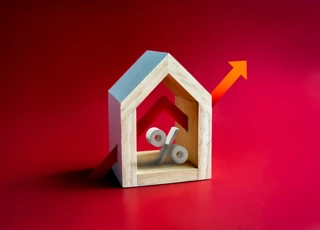 Reviewed by: Danny Belton - Head of Lending
Reviewed by: Danny Belton - Head of Lending
Why has inflation risen?
Back in October 2022, inflation reached an all-time high of 11.1% in the wake of the COVID pandemic and the Ukraine war. This figure has gradually crept down, and in June 2024, it reached the government’s target of 2%. However, July 2024 saw the inflation rate rise (the first increase since December 2023) to where it now stands at 2.2%.
The slight increase was a result of energy costs, such as gas and electricity, falling by less than they did last year, as ONS’s Chief Economist, Grant Fitzner, explains: “Inflation ticked up a little in July as, although domestic energy costs fell, they fell by less than a year ago. This was partially offset by hotel costs, which fell in July after strong growth in June.”1 So despite energy rates falling, it’s still driving inflation up, albeit marginally.
However, the Bank of England (BoE) warned that inflation could rise in the second half of the year2, and the financial market actually predicted a rise to 2.3%. So all in all, whilst the news hasn’t come as a shock, it is certainly keeping everyone on their toes.
The current economic landscape
Whilst it’s true that most of us feel the effects of an increase in inflation, it’s important to remember that prices are currently lower than they have been in 2022 and 2023, when energy and food prices skyrocketed and made paying the bills a struggle for many homeowners.
Today’s slight increase is a reminder that inflation is fluid, and keeping it stable can be tricky as it’s influenced by so many factors. For instance, inflation in the services sector, such as restaurants and hairdressing, is still seeing steep price rises, despite this sector dropping more than expected from 5.7 to 5.2%.3
On the whole, despite the increase, inflation figures look better than expected, with many sectors dropping more than we thought they were going to. Overall this inflation has turned out more positive than people anticipated (2.3% was the original prediction), and because of this, there is a 40% chance that the BoE will cut the bank rate to 4.75% at September’s committee meeting.1
What effect will this have on the mortgage market?
Overall, despite an increase in inflation, things are still heading in the right direction for the UK economy.
With the Monetary Policy Committee announcing a bank rate cut from 5.25% to 5% earlier this month, if we were to see further rate cuts, this would be good news for the mortgage market, and homeowners alike, as lenders also look to cut their rates in line with future predictions.
Deputy CEO at Mortgage Advice Bureau, Ben Thompson, comments: “It’s been a good August for those with mortgages and, indeed, first time buyers. A slight uptick in inflation in July therefore shouldn’t dampen spirits too much, and to some degree was expected.
“However, it’s important to note that inflation holding steady (or indeed falling back down to 2%) in the next few months will be vital to encourage more interest rate cuts from the BoE. That path, however, is also currently expected too.
“For now, lenders would have already factored in the last rate reduction and will be basing current fixed rates on future interest rate expectations. Therefore, we wouldn’t expect this to have a big impact on the rates currently being offered.”
What does this mean for me?
Further bank rate cuts are a positive sign for anybody looking to borrow money. Therefore, if you’re a homeowner looking to move house, or a first time buyer hoping to get on the property ladder, you could benefit from lenders introducing new mortgage deals with lower interest rates.
Similarly, if you’re due to remortgage soon, then now could be a great time to take advantage of falling interest rates, as new mortgage deals start to trickle through to the market.
If you’re currently locked into a fixed rate deal, speak to your mortgage adviser to see what your options are. They can help you decide whether it’s more beneficial to pay the early repayment charge and switch to a cheaper deal, or stay where you are until the fixed period has finished.
Important information
Your home may be repossessed if you do not keep up repayments on your mortgage.
There may be a fee for mortgage advice. The actual amount you pay will depend on your circumstances. The fee is up to 1% but a typical fee is 0.3% of the amount borrowed.
Sign up to our monthly newsletter
Stay up-to-date with all the latest mortgage news and homebuying tips with our monthly newsletter. Jam-packed with helpful information and advice, you'll always know what's happening in the industry and how it might affect you.
Whether you're a first time buyer or getting ready to remortgage, we're here for you with helpful tools, articles and information delivered straight to your inbox.
Ready for some advice? - arrange a call back
Related Articles
Will mortgage rates go down in 2024?
Will mortgage rates go down in 2024? UK homeowners faced soaring mortgage rates in 2023. Discover the economic factors and forecasts shaping 2024's outlook.
< 20 views | 1 year ago
Does the Bank of England base rate affect my mortgage?
Find out everything you need to know about the base rate and what this means for your mortgage.
< 70 views | 16 days ago
No posts currently available



